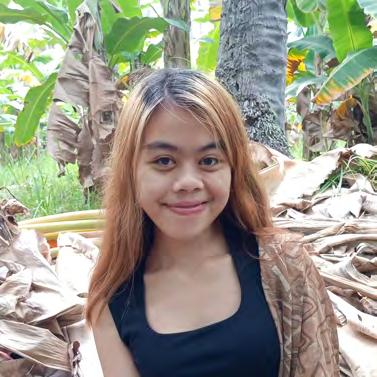
2 minute read
Advocacy and engagement
Fairtrade has strong grassroots support, global reach and a well-trusted mark, yet research showed we had not changed global trade beyond Fairtrade as much as we wanted. That’s why advocacy plays an important role in our current strategy – bringing producer voices to the fore and amplifying our messages on fairer trade that benefits everyone.
Through events such as the Africa Fairtrade Convention and Global Youth Convention, Fairtrade mobilized producers and consumers, the private sector, civil society organizations and governments, to join our advocacy efforts and build partnerships.
In late 2021, we published an analysis of how public policies on fair trade can enable access to markets for producers, support fair trade enterprises and enhance recognition of fair trade principles and networks by governments.
Producers speaking up
In addition to taking a stand on HREDD legislation (see page 11), we are advocating for changes to the EU’s deforestation legislation, so that small-scale cocoa and coffee farmers are protected from unintended harm, and root causes of deforestation, such as poverty, are taken into account. More than 50 NGOs signed an open letter from producers to the EU Green Deal leadership on the subject, thanks to collaboration with the Fair Trade Advocacy Office.
In a more local example, CLAC supported the Paraguayan Fair Trade Platform to become an important actor in the sugarcane sector, advocating on issues of women and young people and promoting government policies for sustainable sugarcane and its by-products. Fairtrade producers also took part in the COP26 global climate meeting in Glasgow in 2021, along with other actions surrounding the event to call for resources for farmers and workers to deal with climate change.
Fair engagement
Consumer action campaigns such as Good Clothes, Fair Pay and Justice is Everybody’s Business are the product of partnerships with other sustainability organizations, where we aim to increase visibility and change public policies on issues of fairness in food and apparel choices. In 2021, Fairtrade Africa mobilized more than 40,000 people through a social media campaign in several countries, raising awareness on issues of climate change and empowering women and young people. For World Fair Trade Day in May 2022, NAPP hosted a webinar for Indonesian business leaders, government representatives and civil society on fair trade as an opportunity in the local and global market.
The 14th International Fair Trade Towns Conference took place virtually in November 2021, hosted by the Swiss Fair Trade network. More than 50 speakers from 23 countries, representing local governments, international agencies and civil society organizations, led discussions on how cities are ‘game changers’ for sustainable development. There are more than 2,000 Fairtrade towns and thousands of Fairtrade schools and universities harnessing the energy and commitment of citizens and young people for fairness and sustainability.
Through Fairtrade, I am motivated to raise my voice and take action. Our diverse thoughts, skills and talents are stronger together, so let us not watch and wait, let us advocate!”

Nicole Gonzalez Fairtrade ambassador and coconut farmer at Farmers Coco
nut Multipurpose Cooperative, Philippines
Lata Admi Shinde has been a garment worker at Purecotz Eco Lifestyles Pvt. Ltd. in India for 17 years. She lives with her husband, son and daughter-in-law. In her previous job she got paid on a piece-rate basis. At Purecotz, Lata’s income is based on her responsibilities in the factory’s finishing department. She has access to health care, and received her salary when the factory was shut down during the pandemic.








